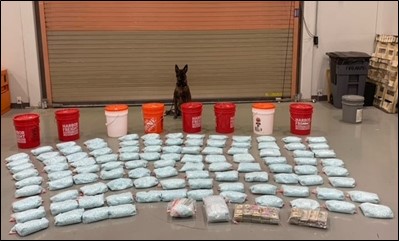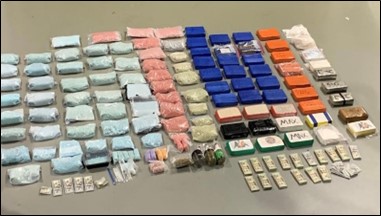Network Operating Multi-Million Dollar Black Market Scheme to Launder Illicit Fentanyl Proceeds
PHOENIX, AZ — Today, Deputy Secretary of the Treasury Wally Adeyemo announced, alongside local leaders and law enforcement in Arizona, that the U.S. Department of the Treasury’s Office of Foreign Assets Control (OFAC) sanctioned operatives in a Black Market Peso Exchange (BMPE) scheme to launder millions in illicit fentanyl proceeds for the Sinaloa Cartel. OFAC designated 15 Sinaloa Cartel members—several of whom are fugitives—and six Mexico-based businesses pursuant to Executive Order (E.O.) 14059. The Sinaloa Cartel, which is one of the most notorious and pervasive drug trafficking organizations in the world, is responsible for a significant portion of the illicit fentanyl and other deadly drugs trafficked into the United States.
“The Biden Administration will continue to use every tool at our disposal to target the violent drug cartels that profit from deadly fentanyl sales in our country,” said Deputy Secretary of the Treasury Wally Adeyemo. “Using Treasury’s unique authorities to disrupt illicit fentanyl networks, particularly in coordination with our law enforcement partners, are among Secretary Yellen and the Department’s top priorities.”
Deputy Secretary Adeyemo announced the sanctions during a trip to Arizona, where he is meeting with federal, state, and local law enforcement, government officials, and private sector counterparts to reinforce Treasury’s partnerships in the fight against illicit fentanyl. These sanctions supplement efforts by Treasury’s Counter-Fentanyl Strike Force, which leverages Treasury’s unique expertise and capabilities to interdict and disrupt the illicit financial networks upon which the cartels rely.
Today’s sanctions are the result of strong collaboration with the Drug Enforcement Administration’s (DEA) Phoenix Field Division’s DEA Local Enforcement Response Squad, as well as DEA Phoenix’s Scottsdale Task Force. This action was also coordinated closely with the Government of Mexico, including La Unidad de Inteligencia Financiera (UIF), Mexico’s Financial Intelligence Unit.
THE BMPE SCHEME: FENTANYL FOR CELL PHONES
OFAC sanctioned Mexico-based cell phone business, Smart Depot, and several related actors, including brothers, Arturo D’Artagnan Marin Gonzalez (Arturo Marin) and Porthos Marin Gonzalez (Porthos Marin), who are responsible for operating a BMPE scheme for the Sinaloa Cartel. In coordination with Sinaloa Cartel fentanyl suppliers, the Marin brothers brokered fentanyl sales in the United States and used the proceeds of the illicit sales—which were in bulk U.S. dollars—to purchase cell phones from U.S. companies. After the phones were transported to Mexico, they were sold in Smart Depot stores—located in Culiacan, Sinaloa; Mazatlan, Sinaloa; and Cancun, Quintana Roo—for Mexican Pesos. As Smart Depot thrived and expanded, the Sinaloa Cartel traffickers received their illicit proceeds in their national currency.
OFAC sanctioned Smart Depot, Arturo Marin, and Porthos Marin for having provided, or attempted to provide, financial, material, or technological support for, or goods or services in support of, the Sinaloa Cartel.
OPERATORS FOR LOS CHAPITOS
OFAC’s action today also sanctioned fentanyl suppliers, Rolando Verduzco Castro (Rolando Verduzco) and Jesus Manuel Leon Valdez (“El Guero de Las Trancas”) (Jesus Leon), who utilized the BMPE scheme run by the Marin brothers to launder their drug proceeds. In addition to fentanyl, Rolando Verduzco is a supplier of methamphetamine, heroin, and cocaine, and he often works in coordination with Fausto Isidro Meza Flores (“Chapo Isidro”). Jesus Leon, who was previously an enforcer for Joaquin Guzman Loera (“El Chapo”), now operates at the direction of Los Chapitos, a reference to several of El Chapo’s sons who lead a powerful faction of the Sinaloa Cartel. Based in Las Trancas, Tamazula, Durango, Jesus Leon oversees clandestine drug labs, producing both methamphetamine and fentanyl.

Figure 1: On August 4, 2022, DEA Phoenix seized approximately 1,175,000 fentanyl pills supplied by Rolando Verduzco in the Phoenix area. (Source: DEA Phoenix)
Adilene Mayre Robledo Arredondo (Adilene Robledo), who is the sister in-law of Arturo Marin and Porthos Marin, as well as her brother, Ivan Yareth Robledo Arredondo (Ivan Robledo), both sanctioned today, were involved in brokering fentanyl deals and laundering money, as well as recruiting drug traffickers to participate in the BMPE scheme. For example, some of the fentanyl suppliers recruited were Alan Gabriel Nunez Herrera (Alan Nunez)—Adilene Robledo’s former partner—and Jesus Tirado Andrade (Jesus Tirado), a clandestine laboratory operator for Los Chapitos who also smuggles weapons. Alan Nunez and Jesus Tirado, both sanctioned today, participated in the BMPE scheme, as proceeds from their illicit drug sales in the United States were used to purchase cell phones that were ultimately sold by Smart Depot.
OFAC sanctioned Rolando Verduzco, Jesus Leon, Adilene Robledo, Ivan Robledo, Alan Nunez, and Jesus Tirado for having engaged in, or attempted to engage in, activities or transactions that have materially contributed to, or pose a significant risk of materially contributing to, the international proliferation of illicit drugs or their means of production.
Also sanctioned today were four businesses established by Adilene Robledo and Ivan Robledo using illicit drug proceeds and Smart Depot profits. Based in Culiacan, Sinaloa, the businesses include Bufaluss and Dulce Volcan, which are involved in food services, as well as clothing/formalwear retailers, Royal Room Dress and Total Look. OFAC sanctioned Bufaluss and Dulce Volcan for being owned, controlled, or directed by, or having acted or purported to act for or on behalf of, directly or indirectly, Adilene Robledo and Ivan Robledo; and sanctioned Royal Room Dress and Total Look for being owned, controlled, or directed by, or having acted or purported to act for or on behalf of, directly or indirectly, Adilene Robledo.
In April 2023, a grand jury in the U.S. District Court for the Southern District of New York returned an indictment charging numerous Sinaloa Cartel members, including Alan Nunez and Jesus Tirado, with a variety of drug trafficking, money laundering, and weapons-related charges. To date, Alan Nunez and Jesus Tirado are fugitives. Through its Narcotics Rewards Program, the U.S. Department of State offers rewards of up to $1 million for information leading to the arrests and/or convictions of Alan Nunez and Jesus Tirado.
OPERATORS FOR EL MAYO
In addition to Los Chapitos, the Marin brothers also used the BMPE scheme to launder drug proceeds for Sinaloa Cartel members who report to Ismael Zambada Garcia (“El Mayo”), El Chapo’s former partner.
For example, Jesus Norberto Larranaga Herrera (“El 30”) (Jesus Larranaga), based in Culiacan and the surrounding municipalities—such as Pueblos Unidos and Tacuichamona—participated in the BMPE scheme. Jesus Larranaga works for his father in-law, Victor Lizarraga Martinez (“El 20”) (Victor Lizarraga), a former police officer turned high-level operator for El Mayo. Karla Gabriela Lizarraga Sanchez (Karla Lizarraga)—the spouse of Jesus Larranaga and daughter of Victor Lizarraga—is also involved in drug trafficking and bulk cash smuggling. In Pueblos Unidos, brothers, Alexis Vergara Meza (“Wini”) (Alexis Vergara) and Edy Vergara Meza (“Carter”) (Edy Vergara), are fentanyl suppliers working alongside Jesus Larranaga.
As suppliers of methamphetamine and fentanyl, among other drugs, Jesus Larranaga, Victor Lizarraga, Karla Lizarraga, Alexis Vergara, and Edy Vergara—all sanctioned today—coordinate drug distribution throughout the United States, launder money, and smuggle bulk cash. Jesus Larranaga also uses illicit drug proceeds to purchase weapons in the United States, which are smuggled across the border to Mexico via couriers.
OFAC sanctioned Jesus Larranaga, Victor Lizarraga, Karla Lizarraga, Alexis Vergara, and Edy Vergara for having engaged in, or attempted to engage in, activities or transactions that have materially contributed to, or pose a significant risk of materially contributing to, the international proliferation of illicit drugs or their means of production.
A SONORA-BASED SCHEME
Also sanctioned today were Jorge Alejandro Garcia Velazco (Jorge Garcia), a San Luis Rio Colorado, Sonora-based associate of the Marin brothers, as well as his spouse, Mayra Gisel Gonzalez Cordero (Mayra Gonzalez), and his cell phone business, Celulandia Taller & Store SLRC (Celulandia). Similar to the Marin brothers, Jorge Garcia operates a BMPE scheme to launder drug proceeds for the Sinaloa Cartel. Assisted by Mayra Gonzalez, Jorge Garcia’s scheme involves Celulandia, which has two locations in San Luis Rio Colorado.
OFAC sanctioned Jorge Garcia for having provided, or attempted to provide, financial, material, or technological support for, or goods or services in support of, the Sinaloa Cartel; and sanctioned Celulandia for being owned, controlled, or directed by, or having acted or purported to act for or on behalf of, directly or indirectly, Jorge Garcia. Furthermore, OFAC sanctioned Mayra Gonzalez for being owned, controlled, or directed by, or having acted or purported to act for or on behalf of, directly or indirectly, Celulandia.

Figure 2: On August 19, 2022, DEA Phoenix seized approximately 630,000 fentanyl pills and 41 kilograms of fentanyl powder supplied by Jesus Leon in the Phoenix area. Among other markings, the fentanyl packaging was stamped with “Chapiza,” a reference to Los Chapitos. (Source: DEA Phoenix)
SANCTIONS IMPLICATIONS
As a result of today’s action, all property and interests in property of the designated persons that are in the United States or in the possession or control of U.S. persons must be blocked and reported to OFAC. In addition, any entities that are owned, directly or indirectly, 50 percent or more by one or more blocked persons are also blocked. Unless authorized by a general or specific license issued by OFAC, or exempt, OFAC’s regulations generally prohibit all transactions by U.S. persons or within (or transiting) the United States that involve any property or interests in property of designated or otherwise blocked persons. U.S. persons may face civil or criminal penalties for violations of E.O. 14059.
Today’s action is part of a whole-of-government effort to counter the global threat posed by the trafficking of illicit drugs into the United States that is causing over 110,000 deaths of Americans annually, as well as countless more non-fatal overdoses and poisonings. OFAC, in coordination with its U.S. government partners and foreign counterparts, and in support of President Biden’s Unity Agenda, will continue to hold accountable those individuals and businesses involved in the manufacturing and sale of illicit drugs.
The power and integrity of OFAC sanctions derive not only from OFAC’s ability to designate and add persons to the Specially Designated Nationals and Blocked Persons List (SDN List), but also from its willingness to remove persons from the SDN List consistent with the law. The ultimate goal of sanctions is not to punish, but to bring about a positive change in behavior. For information concerning the process for seeking removal from an OFAC list, including the SDN List, please refer to OFAC’s Frequently Asked Question 897 here. For detailed information on the process to submit a request for removal from an OFAC sanctions list, please click here.
View more information on the individuals and entities designated today.
View the chart on the individuals and entities designated today.
###


